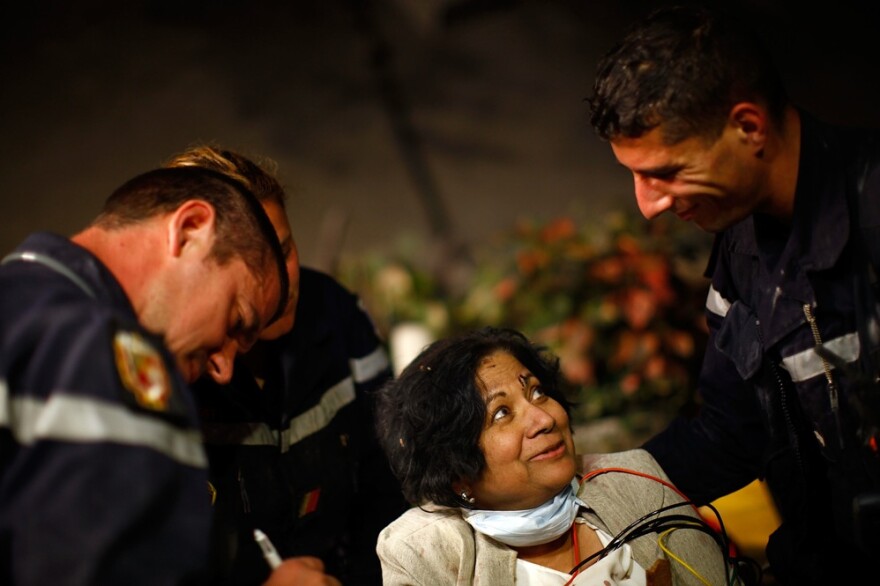In a country with so many immediate needs, Haiti's emergency medical care is near the top of the list.
The country's limited medical infrastructure was all but wiped out in the earthquake. Aid groups and the international community are rushing doctors and medical supplies to Haiti. Meanwhile, Patients with compound fractures, severe lacerations and amputations are sleeping outside while they wait for treatment.
On a sidewalk in the dense Bel-Air neighborhood is one of dozens of makeshift medical clinics that have sprung up across the city.
The clinic has two doctors and two nurses, but few supplies — just Tylenol, a topical antibiotic and bandages. There is no place to send patients with severe injuries.
Serious Injuries Treated Outside
In a heart-breaking scene on a street just outside the city's main hospital, Dr. Nancy Gelin is trying to give an injection to a 7-year-old girl.
Bernadette Bernard, the child's cousin, says the girl was in a neighbor's house when it collapsed. To pull her from the rubble, rescuers were forced to amputate her hand. Her arm is bandaged, but she is still awaiting surgery to have her wound sewn up and properly treated.
Meanwhile she's sleeping in a hospital bed, out in the elements.
Gelin says the hospital itself is another casualty of the earthquake.
"They don't have any electricity inside," Gelin says. "That's the reason the doctors said to put the patients outside. Because it's not safe to stay inside" since part of the hospital collapsed.
The patients who were in the building were moved outside. Earthquake victims, many with serious trauma, are lying on the ground wherever they can find room on pallets, on blankets.
There are people missing arms and legs and suffering internal injuries, trying to get the attention of doctors. Family members sit nearby hoping their loved ones will get help.
Under a tree, an elderly man lies in a hospital bed with a piece of cardboard over his feet. Dr. Hervey Vitale says the man's right foot was smashed in the earthquake.
"We try to clean the wound and give some analgesic for the pain," Vitale says. "And try to prepare him for — he's got to be amputated."
Vitale says he doesn't know how long the elderly man has been waiting. He says the medical staff is trying to help the worst case first.
Need is Dire
The director of the hospital, Dr. Alex Lassegue, is desperate for outside assistance.
"We need material, we need medication, painkillers, antibiotics, and we need everything medical and surgical that would help us," he says.
International medical groups are already here providing what help they can. Still missing, though, is a comprehensive approach to getting medical supplies and doctors where they're most needed.
At Port-au-Prince's main hospital, Margaret Aguirre with the International Medical Corps says the World Health Organization has made available a supply of drugs and medical supplies.
She hopes her team could soon help set up a surgical unit at the hospital.
"Yeah, I mean we hope so," she says. "But we'd have to set up tents and get things sanitized, so we have to be sure we can do that."
The good news is that the international community is responding. Several countries are sending fully equipped field hospitals. The U.N. is planning a large medical facility at the city stadium.
But Dr. Liviu Vedrasco with the International Medical Corps says it is a race against the clock.
"What we will see later is probably some infections starting because of some of the fractures," he says. "So, if those fractures are untreated and unattended, you'll start seeing infections, sepsis, some people dying of other causes, losing blood."
The question for the many Haitians awaiting medical care is not whether it will arrive, but whether it will arrive in time.
Copyright 2022 NPR. To see more, visit https://www.npr.org. 9(MDAzMjM2NDYzMDEyMzc1Njk5NjAxNzY3OQ001))







